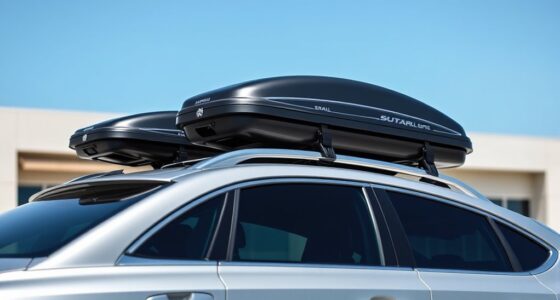Ignoring road trip safety tips can lead to serious consequences. You risk accidents from not wearing seat belts or distracted driving. Your vehicle may break down without proper maintenance, and lacking an emergency kit can complicate roadside issues. You might face legal consequences if safety measures are overlooked, and bad weather could create hazardous conditions. Staying aware and planning ahead can make your trip enjoyable and safe. There's more to contemplate for a successful journey ahead.
Key Takeaways
- Ignoring vehicle maintenance can lead to breakdowns, compromising safety and potentially causing costly repairs.
- Not using seat belts increases the risk of severe injuries or fatalities in crashes, with legal consequences in some states.
- Distracted driving significantly raises the likelihood of accidents, contributing to daily fatalities and injuries on the road.
- Failing to prepare an emergency kit leaves drivers vulnerable during roadside emergencies, affecting nearly 7% of drivers annually.
- Neglecting to plan routes and check weather can result in delays, increased stress, and unsafe driving conditions.
The Importance of Vehicle Maintenance

When you hit the road for a trip, keeping up with vehicle maintenance is essential to avoid breakdowns and guarantee your safety. Ignoring these checks can lead to 1 in 3 breakdowns, resulting in costly repairs and frustrating delays.
Regular maintenance not only enhances road trip safety but can also boost your fuel efficiency by up to 15%, saving you money on gas.
Don't underestimate the importance of your tires; insufficient tread depth can increase stopping distances by over 20%, raising your accident risk.
Additionally, routine brake inspections can prevent up to 70% of brake-related accidents, ensuring safer stops.
Finally, a well-maintained battery can save you from unexpected stranding, making vehicle maintenance vital for a smooth journey. Incorporating smart features into your vehicle can further enhance safety and convenience during your travels.
Risks of Ignoring Seat Belt Use

Ignoring seat belt use can lead to severe injuries or even death in a crash, putting you and your passengers at risk.
Not only are you jeopardizing safety, but you could also face legal consequences and fines for not following the law.
Buckling up isn't just a good idea; it's essential for a safe road trip.
Increased Injury Severity
Not buckling up can drastically increase your risk of severe injury in the event of a crash. Unrestrained passengers face a markedly higher chance of being ejected from the vehicle, with about 30% of vehicle occupant fatalities linked to seat belt non-use. It's better to be safe and buckle up, as seat belts saved an estimated 14,955 lives in 2017 alone.
| Consequences | Risk Level |
|---|---|
| Ejection from vehicle | High |
| Head and spinal injuries | Severe |
| Fatality rate (unbelted) | 30 times greater |
Legal Consequences of Non-Compliance
Although many people may underestimate the importance of seat belt use, the legal consequences of non-compliance can be quite serious.
Ignoring seat belt laws can lead to hefty fines, with some states imposing penalties exceeding $200. If you're involved in an accident while unrestrained, your car insurance mightn't fully cover your injuries, as insurers may consider you partially at fault.
In fact, statistics reveal that unbuckled occupants are 30 times more likely to be ejected from a vehicle during a crash, raising the risk of severe injuries or fatalities.
Additionally, failing to guarantee all passengers are buckled up can result in points on your driver's license, further complicating your driving record and insurance rates.
Dangers of Distracted Driving

Distracted driving poses a considerable risk to your safety and the safety of others on the road. Each day, approximately 9 lives are lost due to inattention, with over 1,000 injuries resulting from crashes involving distracted drivers.
Texting while driving increases your likelihood of crashing by 23 times, diverting your focus from the road and vehicle controls. In 2020, distractions contributed to 8.3% of all fatal crashes, underlining the importance of paying attention.
Common distractions—like using your phone, adjusting the radio, or chatting with passengers—can impair your reaction times greatly, similar to driving with a blood alcohol concentration of 0.08%.
Stay focused and keep your eyes on the road to guarantee a safer journey for everyone.
Consequences of Neglecting Emergency Preparedness

Neglecting emergency preparedness can turn a simple roadside issue into a major crisis. If you don't have an emergency kit, you're increasing your risks during roadside emergencies—nearly 7% of drivers face breakdowns each year, often left stranded without help.
Without basic supplies like first aid items or tools, you could find yourself in serious trouble, as 28% of motorists have reported significant challenges in such situations. Not knowing nearby medical facilities also heightens the risk; over 30% of travelers aren't aware of local services.
Plus, if you don't plan for potential injuries, you might face untreated health issues, affecting 20% of road trip participants. Remember, every minute counts, and having emergency contacts ready can drastically improve your road safety.
Legal Implications of Road Incidents

When you're on a road trip, understanding the legal implications of incidents is essential.
If you ignore safety measures and end up in an accident, you could face liability for damages and injuries.
Plus, missing the statute of limitations could cost you your chance to seek compensation.
Liability and Compensation Rights
Understanding your liability and compensation rights is crucial after a road incident, especially since the aftermath can be overwhelming.
Knowing your rights can help you navigate the complexities of the situation. Here are key points to reflect on:
- Liability: Determine who's at fault for the accident, as this affects your compensation rights.
- Documentation: Collect evidence, like photos and witness statements, to support your claim.
- Compensation: You can seek reimbursement for medical expenses, lost wages, and pain and suffering.
- Legal Advice: Consult a legal professional to understand your options and effectively deal with insurance companies.
Taking these steps can greatly influence your ability to secure the compensation you deserve.
Statute of Limitations
After grasping your liability and compensation rights, it's important to be aware of the statute of limitations that applies to road incidents.
For motor vehicle accidents, this timeframe usually ranges from one to six years, varying by state. If you don't file your claim within this period, you risk losing your right to seek compensation for injuries or property damage.
The clock starts ticking on the accident date, so it's essential to gather evidence and documentation quickly. Certain circumstances, like being a minor or discovering injuries later, can extend this timeframe.
Engaging a legal professional promptly is critical to navigate the complexities of the statute of limitations and guarantee you're protected.
Don't delay; time is of the essence.
Impact of Weather Conditions on Safety

Weather conditions can dramatically impact your safety on the road, making it vital to stay alert and adjust your driving.
With approximately 22% of vehicle crashes being weather-related, here are some important tips for road safety during adverse conditions:
- Reduce Speed: Slower speeds help maintain control, especially on wet or icy roads.
- Increase Following Distance: Give yourself extra space to react; stopping distances can increase considerably in adverse conditions.
- Stay Informed: Keep an eye on weather forecasts and be prepared to change your route if necessary.
- Use Headlights Wisely: In fog or heavy rain, make sure your visibility is ideal by using headlights appropriately.
The Role of Awareness and Planning in Road Trip Success

While planning your road trip might seem tedious, it’s essential for ensuring a safe and enjoyable journey. Your awareness of potential risks can greatly reduce the chance of accidents. Additionally, mapping out your route in advance allows you to identify rest stops and fueling stations, which can be crucial during long stretches of travel. Being well-prepared also means checking your vehicle’s condition before hitting the road, including tire pressure and fluid levels. Remember, taking these precautions will help you stay safe while driving and make your trip more memorable for all the right reasons.
For instance, 40% of road trip accidents are due to driver fatigue, so scheduling regular breaks is vital. Proper planning minimizes distractions, helping you stay focused and reducing the nearly 15% of fatal crashes linked to distracted driving.
Conducting pre-trip vehicle inspections lowers breakdown risks, as 60% of roadside assistance calls are for preventable issues. Additionally, planning your routes and checking the weather in advance can cut travel time by up to 30%, which not only reduces stress but also enhances your overall road trip experience.
Frequently Asked Questions
How to Stay Safe During a Road Trip?
To stay safe during a road trip, make certain your vehicle's maintenance is up to date.
Check your tire pressure and brakes before hitting the road.
Keep a safe following distance of at least four seconds, and avoid distractions like texting while driving.
Always buckle up, as seat belts save lives.
Remember to take breaks every two hours to combat fatigue.
These simple steps can help guarantee a smooth, safe journey.
Are Road Trips Hard on Your Body?
Think of a marathon runner's body after a grueling race; your body can feel just as worn out after a long road trip.
You're sitting for hours, which can lead to back pain and stiffness. Fatigue creeps in, clouding your focus and slowing your reactions.
Plus, the confined space can hinder blood circulation, increasing risks like DVT.
Don't forget the sun's rays—those can damage your skin without you even realizing it.
How Often Should You Take a Safety Stop on a Long Road Trip?
You should take a safety stop every two hours during a long road trip.
These breaks help you stay alert and reduce the risk of drowsiness, which contributes to many accidents. Stopping allows you to stretch, refresh, and recharge, making the journey more enjoyable.
Plus, it gives passengers, especially kids, a chance to release some energy. Regular breaks can also lower stress and anxiety, enhancing your overall travel experience.
When to Not Take Your Car on a Road Trip?
Imagine a ship with frayed sails setting out to sea; it's bound for trouble.
Similarly, you shouldn't take your car on a road trip if it's over ten years old or lacks recent maintenance. If warning lights flash on your dashboard or your tires and brakes show signs of wear, it's time to reconsider.
Also, if your battery's older than three years and struggling, don't risk getting stranded—choose wisely!
Conclusion
To sum up, ignoring road trip safety tips can turn your adventure into a nightmare faster than you can say "flat tire." By keeping up with vehicle maintenance, buckling up, staying focused, preparing for emergencies, and being aware of weather changes, you'll guarantee a smoother journey. Remember, a little planning goes a long way. So, hit the road with your eyes wide open, and you'll avoid trouble before it even shows up at your doorstep!









